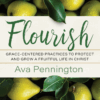Hi! I’m Kathy Ide. In addition to being a published author, I’m a full-time professional freelance editor. For CAN, I’m blogging about “PUGS”–Punctuation, Usage, Grammar, and Spelling…tips for writers based on the most common mistakes I see in the manuscripts I edit. Each blog post will have one tip for each of the four categories. For more PUGS tips, check out my website, or get a copy of my book Proofreading Secrets of Best-Selling Authors (due for release this month). If you’re interested in working with a freelance editor (or know someone who is), e-mail me through the contact page of my website. Or go to the Christian Editor Network to get referrals to other established, professional editorial freelancers. If you’re a freelance editor yourself, or think you might be interested in that field, check out The Christian PEN: Proofreaders and Editors Network.
PUNCTUATION TIP
Vertical Lists after Introductory Phrases
If a list completes a sentence that begins with an introductory phrase, don’t use a colon after the introductory phrase. If any of the phrases or sentences in the list have internal punctuation, semicolons may be used at the end of each item. Each item begins with a lowercase letter. A period should follow the final item.
Example:
You can reduce redundancy in your writing by
avoiding repetition;
stating what you mean in the fewest words possible;
omitting unnecessary adverbs and adjectives;
eliminating weak words like actually, basically, definitely, extremely, so, and very.
USAGE TIP
council/counsel
council (noun): an assembly/meeting or an advisory or legislative group
Example: “city council”
counsel (noun): advice, or a lawyer or consultant
Example: “Tracie gave me good counsel when she suggested I hire legal counsel.”
counsel (verb): to advise or consult
Example: “June counseled with her agent before signing the book contract.”
GRAMMAR TIP
was vs. were
The subjunctive mood (were) is used to express the following:
1. A condition contrary to fact
“Oh, I wish I were an Oscar Mayer wiener.”
(Of course, I’m not. But that jingle will be stuck in your head all day now, won’t it?)
2. A supposition
“Suppose Marci were to arrive right now.”
3. An improbable condition
“Carrie drank the Pepsi as if there were no tomorrow. (Highly unlikely)
4. Uncertainty or doubt
“If I were to marry you, how would you support me?” Irene asked.
(There’s uncertainty/doubt about whether she will marry him.)
5. Necessity
“If it were absolutely necessary, I could rewrite my manuscript,” David said.
6. A desire
“Joan wishes she were going to the prom with Brandon.”
SPELLING TIP
insofar as

